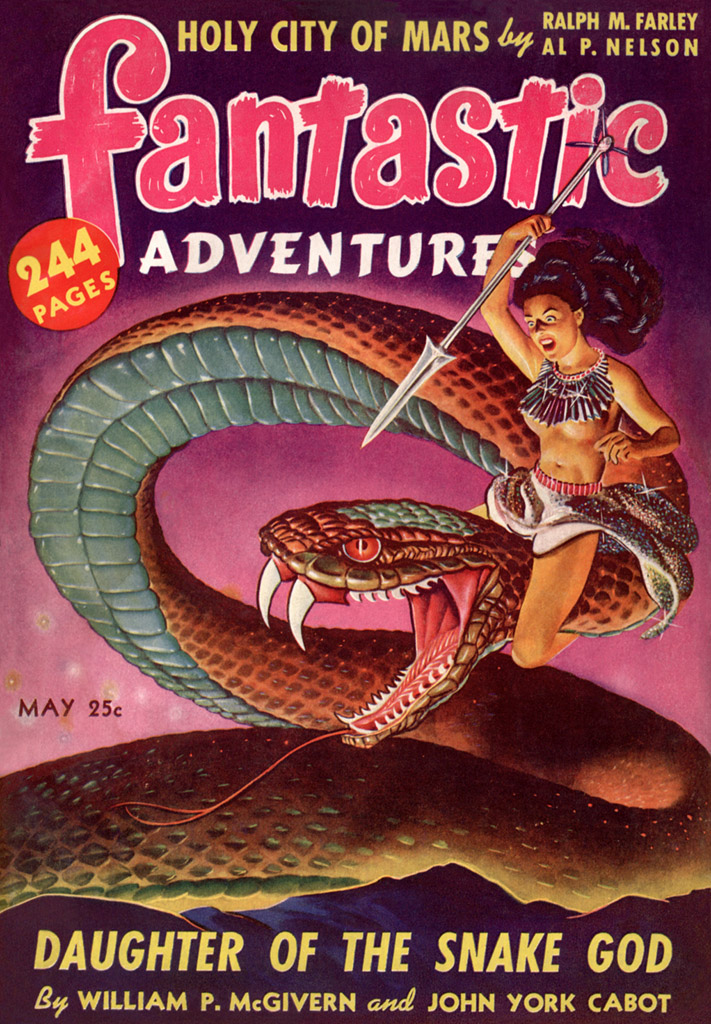
Grab it Right Over
Fantastic Adventures (May 1942)
“Warren swore to return to the holy city of Daloss to find a girl and avenge his 3000 comrades; and he did.” -- “Only terror lay in the Holy City of Daloss, but Don Warren went back to find Esta, the daughter of the chieftain, and to avenge the death of his entire regiment.”
Tonight I ran an 'Astonishing Swordsmen and Sorcerers of Hyperborea' one shot game but set on ancient Mars. More specifically in the ancient horror filled city of Daloss. I had six players and the game when very well. The players were really pleased with the system. Much of this setting was taken from my regular Post Apocalyptic Mars for the Stars Without Numbers game with less technology and far more 'Sword and Planets ."
The story itself takes place in the post colonial Martian period, but tonight's game was set thousands of years before that in the surrounding countryside and the damned rites of Erlik were taking half of the villages by storm. The party were gathered from the surrounding villages to deal with the situation in tribal justice fashion.
The PC's were a mixed party of kilt wearing swordsmen, psychics, and wizards from the various villages assembled to journey into the heart of Daloss.
Thanks to Mr.Ralph Milne Farley, Edgar Rice Burroughs, and some other traditionally solid science fantasy writers. The game went very, well in part due to the system and the inginuity of the players. A side line encounter with the apes of Mars ended with only the loss of two Sliths and a minor artifact instead of the PC's.
More to come on Monday as the party journeys into the heart of the Martian wasteland.
The PC's were a mixed party of kilt wearing swordsmen, psychics, and wizards from the various villages assembled to journey into the heart of Daloss.
Thanks to Mr.Ralph Milne Farley, Edgar Rice Burroughs, and some other traditionally solid science fantasy writers. The game went very, well in part due to the system and the inginuity of the players. A side line encounter with the apes of Mars ended with only the loss of two Sliths and a minor artifact instead of the PC's.
More to come on Monday as the party journeys into the heart of the Martian wasteland.
Will The Real "Ralph Milne Farley"
Please Stand Up ?!?
The gentleman who wrote this evening's setting background wasn't Edgar Rice Burroughs but Ralph Milne Farley. Who isn't actually Ralph Milne Farley.
He's actually Roger Sherman Hoar an most remarkable individual in the annals of science fiction and science fantasy. He was also a friend of Edgar Rice Burroughs as well.
According To Wiki:
Please Stand Up ?!?
The gentleman who wrote this evening's setting background wasn't Edgar Rice Burroughs but Ralph Milne Farley. Who isn't actually Ralph Milne Farley.
He's actually Roger Sherman Hoar an most remarkable individual in the annals of science fiction and science fantasy. He was also a friend of Edgar Rice Burroughs as well.
According To Wiki:
Roger Sherman Hoar (April 8, 1887-October 10, 1963) was a state senator and assistantAttorney General, state of Massachusetts.[1] He also wrote science fiction under the pseudonym of "Ralph Milne Farley".


Under the pseudonym Ralph Milne Farley, Hoar wrote a considerable amount of pulp-magazine science fiction during the period between the world wars, appearing in such publications as Argosy All-Story Weekly, Weird Tales, True Gang Life, and Amazing Stories, as well as occasional essays for The American Mercury, Scientific American, and science fiction fanzines. His works includeThe Radio Man and its numerous sequels, chiefly interplanetary and inner-world adventure yarns in the tradition of Edgar Rice Burroughs, with whom he was friends; Hoar also wrote a number of archetypal time-travel-paradox tales, collected in book form as The Omnibus of Time, and "The House of Ecstasy," told in the second-person and frequently reprinted since its initial appearance in Weird Tales (April 1938 issue). Hoar's other pseudonyms include Robert S. Lerch, R. S. Lerch and L. R. Sherman.
Upon relocating to the Midwest, where he worked as a corporate attorney for the firm of Bucyrus-Erie, Hoar joined the Milwaukee Fictioneers, whose members included Stanley G. Weinbaum, Robert Bloch, and Raymond A. Palmer. When Chicago-based Ziff-Davis Publishing Company bought the ailing Amazing Stories in 1938, Hoar was offered, but declined, the magazine's editorship and recommended Palmer, who held the position through the 1940s.
No comments:
Post a Comment
Note: Only a member of this blog may post a comment.